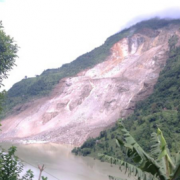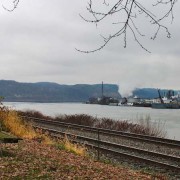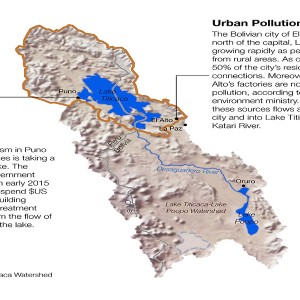Line 5 Pipeline Task Force Highlights Weakness in Enbridge Management
Pipeline owner criticized for lapses in inspection and disclosure.

By Miranda Cawley
Circle of Blue
Along with recommending a study of safer alternatives and a clearer accounting of the full cost of a large oil spill, the authors of an important state assessment of the safety of an oil pipeline that crosses Lake Michigan were critical of the pipeline’s oversight by its owner, Calgary-based Enbridge, Inc.
Among the lapses in oversight noted by the authors of the Michigan Petroleum Pipeline Task Force Report were:
-
1. Not disclosing the results or protocols of inspections Enbridge conducts on the pipeline, known as Line 5.
2. Not acknowledging that the entire, nearly eight-kilometer (five-mile) length of the submerged pipeline where it crosses the Straits of Mackinac is encrusted with quagga and zebra mussels, which prevent divers from actually seeing the surface of the pipeline. Acidic secretions from the mussels also may be degrading the pipeline coating and causing corrosion. These important safety concerns have not been evaluated by Enbridge.
3. Enbridge failed for years, said the report, to “maintain the legally required intervals for pipeline supports.” Due to “the very significant underwater currents at the Straits, there is a need to analyze the resulting stresses on the pipelines and potential impacts to their integrity.”
4. The task force criticized Enbridge’s “conflicting, incomplete, and inadequately supported estimates of its total liability” over a hypothetical spill in the Straits. The significance of the weaknesses in Enbridge’s oversight “can only be resolved by full disclosure of additional information, and rigorous independent review by qualified experts,” said the report, which was released earlier this month.
Enbridge insists that the 62-year-old pipeline is as safe as the day it was opened in the early 1950s. But the company’s record of ruptures and big oil spills in its continental oil pipeline network, including a calamitous spill five years ago along the Kalamazoo River, has made Line 5 a target of public protest and growing clamor for its closure.
The Pipeline Task Force report’s authors stopped short of recommending a shutdown, but also indicated that the state had the authority to take that action. The report questioned Enbridge’s intent to operate Line 5 indefinitely, asserting the company’s strategy “is not a reasonable position.”
At this point, the state Attorney General’s Office said there are no plans at present to sue Enbridge. Andrea Bitely, a spokesperson, said the attorney general is “looking into a lot of options for the future of the pipeline.” The report’s first steps towards action on Line 5 include convening an independent review board, which Bitely said would start as soon as possible, though no public timeline has been set.
Enbridge executives indicated that they were willing to cooperate with the state and did not comment on the possibility of legal action. Last week, Enbridge Senior Manager of Operations and Project Communications Michael Barnes said that the company “will review the entire report and will work with the Michigan state government to further understand the recommendations and the additional analysis that is being proposed.”
David Holtz, chair of the Michigan Chapter of the Sierra Club, noted that Attorney General Bill Schuette, who joined the state Department of Environmental Quality in convening the task force last year, does not shy away from big court actions.
“In the past, Attorney General Schuette has not been afraid of going to court,” he said. “When it comes to protecting the Great Lakes and taking on the oil industry, there’s a cautious approach from the attorney general. Values and politics don’t align when it comes to taking action against the oil industry.”
Holtz, who supports closing Line 5, said that it is up to Michigan’s citizens to “finish the story.”
is an editorial intern for Circle of Blue based in Traverse City, Michigan. She is a senior at Northwestern University studying multimedia journalism and environmental sciences. Her interests include food security, environmental justice, and Latin American environmental policy.
Leave a Reply
Want to join the discussion?Feel free to contribute!









Did Enbridge pay the $100 Million Dollar Fine that was promised due to its destruction in the Kalamazoo River? The deadline to impose that fine was yesterday.
If not, what politicians got free internships for their daughters? Which ones got the country-club membership option?
I never took into account the fact that mussels can secrete acid which can degrade the coating of pipelines and cause corrosion. In that case, proper maintenance and rehabilitation services should be given priority when you own establishments or facilities with such materials. I can imagine how doing so will save you from further expenses and from accidents and health hazards for your workers as well.